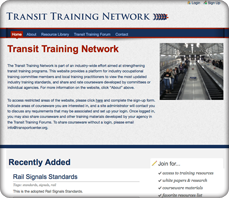News
The Widespread Issue of Inadequate Training for BEB Maintenance
Posted August 2021
Research from CALSTART shows that 2,800 zero emission buses (ZEBs) have been delivered or were on order in the U.S. as of December 2020, a 24% jump from 2019. The Bipartisan Infrastructure Deal provides more than $5 billion in funding for public transit agencies to adopt low- and no-emissions buses.1 Fifteen states and Washington, DC have followed California’s lead in signing an agreement to switch all heavy-duty trucks, vans, and buses over to running on electricity by 2050.2 This is an investment in public transportation, the environment, and the U.S. economy.

Battery Electric Buses (BEBs) are currently the most prevalent zero-emission bus technology in the U.S. and make up the bulk of U.S. transit agency ZEB procurements. Despite the boom in sales, technicians at most agencies are unprepared to maintain these highly advanced buses. To help alleviate the gap in frontline technician training on BEB maintenance, the International Transportation Learning Center (ITLC) worked with multiple Original Equipment Manufacturers (OEMs) to deliver three virtual learning sessions on BEB familiarization. During one of the webinars, attendees responded to a series of poll questions indicating their level of involvement with and preparedness for BEBs. Of the approximately 50 responses received, 55 percent said their agencies had not provided any training on BEBs. Of those that had received training, 77 percent rated the BEB training provided as “poor.” Additionally, an astonishing 83 percent of respondents to a poll during the 2021 Amalgamated Transit Union (ATU) Legislative Conference felt their members were not adequately trained to work on ZEBs.
These poll results give a hint of what is (and isn’t) occurring at transit agencies across the country. As ZEBs become the norm in the industry, many agencies have been relying almost exclusively on extended warranties to cover repairs and have not provided their maintenance workforce with the training needed to safely and efficiently maintain and repair these buses and related charging infrastructure. This path of relying too heavily on extended warranties may appear attractive in the short-term, but will prove disastrous down the road. The inability of technicians to maintain and repair ZEBs will place agencies at the mercy of third-party providers not only in terms of costs, but in delays as agencies wait for repair services to be delivered.
The transit workforce is also understandably concerned regarding the safety of new electrical equipment. Going from traditional low-voltage bus electrical systems to potentially life-threatening ZEB propulsion with up to 800 volts creates real safety concerns, especially when existing training on these new vehicles is inadequate.
The solution? Invest in training at the very beginning of the process, when your agency purchases ZEBs, and develop a long-term plan for continued refresher training:
- Include maintenance and operations employees in the procurement process by having workers provide input into the technical specifications and bid review process. This can help address workers’ concerns. The input of highly experienced frontline workers throughout the procurement process helps assure that new buses delivered to the agency will benefit the agency, the riding public, and workers. King County Metro and Toronto Transit Commission both have procurement committees involving frontline workers. The committee usually involves equal numbers of management and labor representatives. Training is key for frontline workers to be effective on these committees.
- Agency Request for Proposals (RFPs), which define procurement requirements and specifications, can be used to provide ZEB training and set standards for the quantity and quality of the training. This training can be delivered by the OEMs, related vendors/suppliers, or by third-party training organizations. An agency should, as part of its procurement process, require OEM training to be comprehensive to the point where agency technicians are qualified to perform warranty work in-house. Doing so puts agency’s repair proficiency on par with the OEM’s expertise, thereby guaranteeing that BEB maintenance work can be performed by agency personnel during the warranty period and long after it expires.
- Register a Bus Maintenance Apprenticeship with a focus on electrical and electronics skills to serve as a foundation for ZEB training, and to establish a long-term solution that provides technicians with the training needed to maintain ZEBs. Apprenticeships rely in great part on fully trained and experienced senior technicians to serve as mentors, role models that are able to demonstrate and explain the maintenance procedures so that new technicians are engaged in the hands-on learning experience.
Dependable, well-maintained ZEB fleets are only possible with an accompanying investment in human capital. Research has proven that quality training for frontline transit workers has a high return on investment – up to 700%.3 This initial investment is as important as the purchase of the bus itself because it keeps workers safe and ensures adherence to service schedules.
The International Transportation Learning Center is working with a team of industry experts to develop recommended procurement language that can be customized and inserted into an agency’s RFP for ZEBs. This language will ensure that quality training for the maintenance and operations workforce becomes an integral part of new bus procurements. Stay tuned for the release of the recommended language! For more information on the recommended ZEB RFP language, please contact Karitsa Holdzkom .

